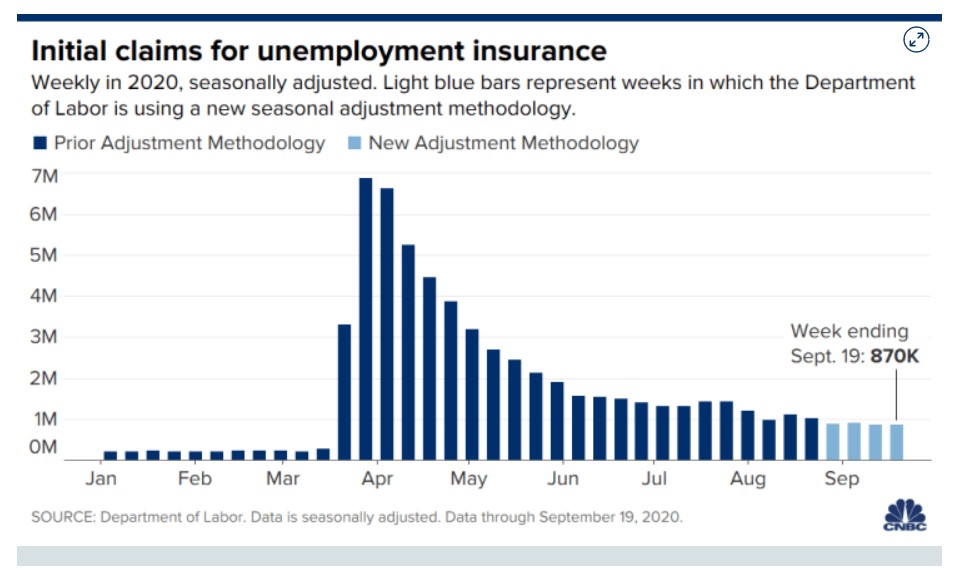On Tuesday, House Democrats unveiled a $2.2 Trillion spending bill in response to the Coronavirus Pandemic. It is a scaled-back, updated version of their Heroes Act relief bill in May with a much larger price tag of $3.4 Trillion. The Wall Street Journal reports that "the legislation includes money for restaurants, airlines, child care centers, and performance venues hit hard by the pandemic as well as funding for the postal service, which Democrats have said is needed before Election Day. The new bill would include another round of direct checks to Americans, at $1,200 per taxpayer, and $500 per dependent. And it would renew the $600 in supplemental unemployment aid that expired in July, according to the text. The amended Heroes Act is sponsored by Appropriations Committee Chairwoman Nita M. Lowey (D-NY). It has a number of co-sponsors.
Important items in the Bill are as follows:
- Extension of Paycheck Protection Program which expired August 8
- $436 billion in funds for state and local governments
- 15% increase in food stamp benefits
- $28 billion for both vaccine and its procurement, including 7 billion for distribution and $1billion for public awareness campaign
- $2 billion for PPE (personal protective equipment)
- Increases federal Medicaid funding
- $225 billion in funds for schools, "including $182 billion for K-12 schools and nearly $39 billion for postsecondary education – and $57 billion to support child care for families."
- Money for taxpayer identification numbers, not just social security numbers
- $600 per week in enhanced federal unemployment benefits through January
 House Republicans are already grumbling about the bill, due to its massive multi-trillion dollar price tag. Republicans want further spending to be more limited. Republicans are not likely to agree to substantial, ongoing unemployment benefits. Those benefits have been a sticking point this summer because it seems to have incentivized many to stay home and collect a "paycheck" courtesy of the taxpayer.
House Republicans are already grumbling about the bill, due to its massive multi-trillion dollar price tag. Republicans want further spending to be more limited. Republicans are not likely to agree to substantial, ongoing unemployment benefits. Those benefits have been a sticking point this summer because it seems to have incentivized many to stay home and collect a "paycheck" courtesy of the taxpayer.
"Rep. Tom Reed (R., N.Y.), co-chair of the Problem Solvers Caucus, which released a $1.5 trillion proposal earlier this month, said he was concerned House Democrats might be spending too much by going beyond the most urgent priorities. 'It may be too large of a package that goes beyond that immediate need.'”
According to CNET.com, "if nothing changes, Oct. 9 -- the final day of the Senate session -- is the last time a bill has to clear the upper chamber, but it still isn't the final day a bill could pass. The House, for example, plans to postpone the start of its next break, originally scheduled for Oct. 2, until a deal is reached. If the bill passes the Senate on or by Oct. 9, the House could pass it after that date. And if negotiators close in on a deal, Senate Majority Leader Mitch McConnell could also compel the Senate to stay in session longer or come back early to vote on a proposal."
 Also, House Republican Whip, Steve Scalise (R-Louisiana) tweeted that House Dems are trying to "pull a fast one by stripping the Bill of $600 million in police funding."
Also, House Republican Whip, Steve Scalise (R-Louisiana) tweeted that House Dems are trying to "pull a fast one by stripping the Bill of $600 million in police funding."
The mood in D.C. may be too politically charged to negotiate a big spending bill by the election. Some politicians may want to wait until the election is decided to pass legislation on spending. November 3rd will be here in a little over a month from now. In the meantime, many who are still struggling from the economic effects of the Coronavirus will await further relief.
A one page summary of the Heroes Act is here. A title-by-title version of the Bill is also available.


